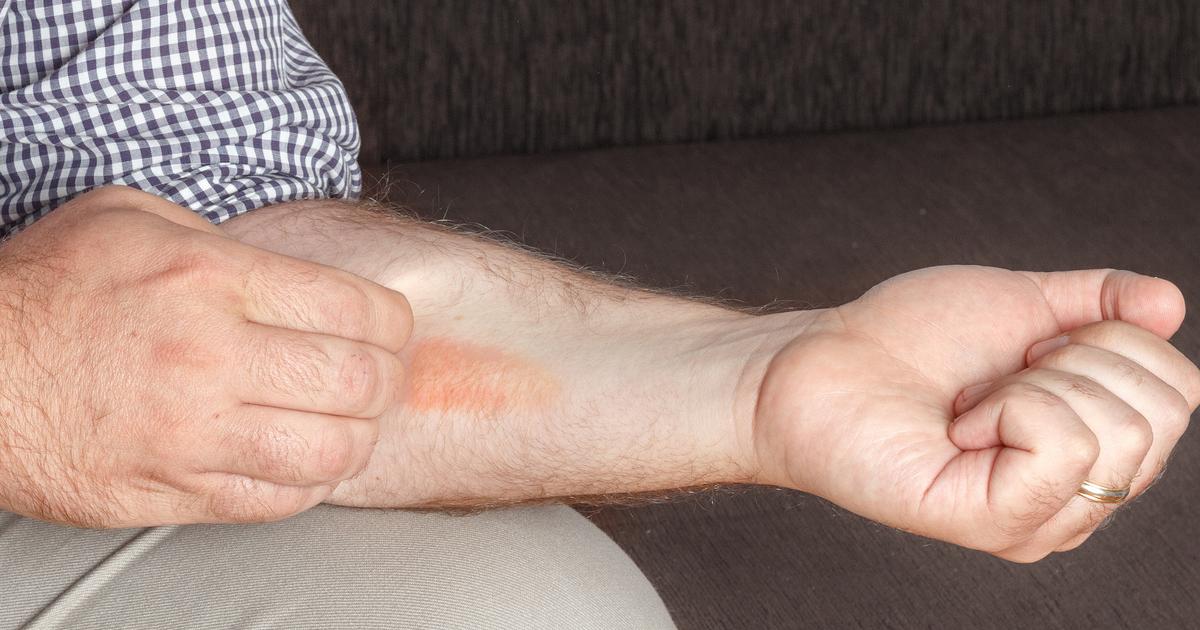Potential Side Effects Of Tea Tree Oil
Many essential oils are used for a variety of purposes including cosmetics, medicine, cleaning, and pest control. One of the most popular essential oils is tea tree oil. Tea tree oil can serve several purposes, including promoting the health of the nails, hair, and skin. However, tea tree oil is also very potent and potentially toxic. Individuals should never ingest tea tree oil, and they should be aware it can have side effects if it's not diluted well enough. Individuals should always use tea tree oil as directed. They should never use it around pets, even in a diffuser, as it is highly toxic to dogs, cats, and other animals. Tea tree oil comes from a native Australian tree and has been used in Aboriginal medicine for thousands of years.
Get familiar with the potential side effects linked to tea tree oil now.
Scaly Or Dry Skin

If individuals apply tea tree oil to their skin, they might experience skin irritation. Tea tree oil is a very potent substance that will irritate or harm the skin if it isn't diluted properly. Just a few drops of tea tree oil in a quart or gallon of water can be very potent. Thus, it's clear individuals don't need a lot. Individuals are more likely to develop dryness and scaling if they use tea tree oil in higher concentrations. Dry skin occurs when there's not enough moisture on the skin, which causes it to become itchy, cracked, and scaled. There are dozens of causes of dry skin, some of which might be medicinal and others might be environmental. If individuals notice their skin is scaled or dry in places they didn't apply the tea tree oil, the oil might not be the culprit. However, if the patches of scaling or dryness are appearing exclusively in places treated with the oil, individuals might need to use a more diluted concentration in the future.
Keep reading to learn more about the side effects of tea tree oil now.
Itching Or Burning Sensations

Itching and burning sensations can occur when individuals use tea tree oil that hasn't been diluted well enough. These sensations might start very shortly after applying the oil, although some individuals experience a delayed reaction. If individuals experience painful sensations like burning or itching after putting anything new on their skin, it's a sign they should wash it off. Individuals should remove the oil and try not to scratch their skin too much. If they do scratch and get the oil on their fingertips, they must wash their hands as well. Burning and stinging sensations are cause for concern because they indicate the skin is being harmed. If the burning is severe, individuals should get in contact with a doctor right away. However, if the burning is only mild, their best bet is to wash the affected area thoroughly and use at-home remedies for any lingering sensation. Some skin irritation might be treated with certain lotions or ointments. Individuals with sensitive skin are more likely to experience burning or itching as a result of essential oil use.
Uncover more potential side effects of tea tree oil now.
Dermatitis

Dermatitis may occur in some individuals who use tea tree oil. This is an allergic reaction that appears on the skin after contact with an allergen. Allergic contact dermatitis tends to create rashes that are itchy, swollen, and red. If an individual has never used tea tree oil before, they should test it on a very small patch of skin to be sure they aren't allergic. Some individuals might experience allergic contact dermatitis if they use improperly stored or older tea tree oil, even if they've used tea tree oil successfully in the past. It's always important to store essential oils in the right conditions. If they get too hot or are exposed to other hazards, individuals shouldn't continue using them. Individuals are more likely to react badly to tea tree oil if it's expired or improperly stored, but some are also allergic to fresh tea tree oil, which is why testing it first is so important. Allergic contact dermatitis is more likely to occur in those with sensitive skin, and the reactions may be more serious if the oil isn't diluted well enough.
Read more about the various side effects of tea tree oil now.
Headache

Tea tree oil isn't always applied to the skin. It can also be used in a diffuser for aromatherapy. The diffuser creates steam with small particles of the oil in it, which are meant to help individuals relax when they inhale the steam. Individuals should never use diffused tea tree oil in a household with cats or dogs, as this essential oil can be dangerous for them to inhale. They should also limit the amount of time they spend inhaling tea tree oil, as breathing in too much of the oil, or being exposed to it for too long, can bring on a variety of physical symptoms, one of the most common being a headache. Most headaches are mild, and they should dissipate after spending some time in the fresh air. If individuals notice they're getting a headache, they should turn the diffuser off and open a window or move to another room. If the headache is severe and doesn't go away after the individual has not been breathing in the oil, they might need to see a doctor.
Discover additional side effects of tea tree oil now.
Nausea

Nausea is another effect of inhaling too much tea tree oil for too long. This symptom will often accompany a headache and a feeling of dizziness or vertigo. The nausea caused by inhaling tea tree oil might make individuals feel like they want to throw up. It will often subside after they get some fresh air, similarly to a diffuser-induced headache. The nausea is the body's way of alerting an individual to the fact they are being exposed to too much of a potentially toxic substance. If individuals start feeling nauseous and dizzy around their diffuser, especially on a regular basis, they should stop using tea tree oil in it. Aromatherapy isn't effective if it's making individuals feel sick. Those who experience nausea should keep an eye on it after they stop inhaling the oil to make sure they stabilize.